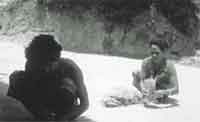Born again
Born again

the forests of Melaghar in Sonmara sub division of west Tripura, that were once nearly denuded, have been revived through joint forest management ( jfm) .
The Melaghar jfm area known as "Jeevan Deep' is an unique example of coppice protection through people's participation. Sal and teak trees, 7-15 feet tall, have come up within just three years. Forest officers and experts opine that besides providing floral protection, the area has shown marked improvement in faunal diversity. Tripura is the first north-eastern state where jfm has been implemented. A pilot project was started by the forest department with the assistance of the Acharya Jagdish Chandra Bose Briksha Mitra Sangh ( ajcbbms ) in 1991-92. The project comprises of a core area of 100 ha and feign area of 135 ha . The legal status of the area is that of a proposed reserved forest.
The Melaghar region once housed a dense forest of sal, teak, and gargan, but was totally deforested and degraded over the years. Explaining the various causative factors, Hiralal, member ajcbbms, said "the destruction started in 1971 during India-Bangladesh war when a large number of refugees from across the border took shelter in the thick forests. Some forests still remained till 1978. However, by 1990 there were no forests left.' In 1993, the first coppice protection exercise was started with 230 beneficiaries from gram sabhas namely east Nalchar, Chandigarh, Mohanbhog, and Rudijala.
These villages include general as well as tribal population comprising of Ring, Noatia, and Deb-barma tribes. Initially, about 40 ha of degraded forest was selected for coppice protection, and a Forest Protection and Regeneration Committee ( fprc ) was constituted as per government guidelines. The fprc has a total of seven members







